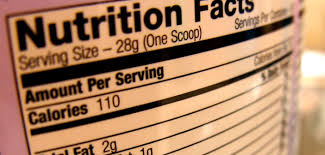
Normally, when we think about our future, most of us visualize a prosperous life. Although DNA does play a major role, your daily activities can impact your lifespan as well. Healthy eating is not about starving yourself or forcing yourself to stick to a “diet” no one wants to talk about. Rather, it’s about eating the food you want to in moderation, feeling great, having more energy and improving your health and mood.
Ever feel overwhelmed by all the conflicting diets and nutrition advice out there? Don’t worry, you’re not alone. It seems that for every expert who tells you that a certain food is good for you, you’ll find another saying exactly the opposite. It’s enough information to make you want to give up. Quite often, the convenient foods found at the local grocery store are flavored with too much sugar, salt, and unhealthy ingredients.
Many of these unhealthy ingredients are hidden, which is why it’s important to pay more attention to food labels. It’s necessary to know what you are putting into your mouth. By reading food labels, you get to compare and find food that has the nutritional value your body needs.
If you want to try your best to ensure a long life, try adapting these 5 tips, daily habits that can help increase your lifespan.
Eat Less Meat
Researchers have recently discovered that societies who live the longest consume meat sparingly, and there’s good reason to adopt that type of dining habit. Scientists have also found out that people who consume approximately one serving of red meat (beef, pork, or lamb) per day have a 13 percent increased risk of premature death, compared with those who eat very little meat. Processed meat consumption also resulted in about 20 percent increased risk of an early death from ailments including cancer and heart disease.
The study done by the National Library of Medicine later found that people replaced one serving of red meat with alternative food decreased their risks of premature death by between 7 percent and 9 percent. Sub out meat for an alternative protein source, like avocados, and give yourself one more reason to eat more guacamole. So start switching up your proteins, and try your best to limit your calorie intake by using meat to flavor your meals instead of starring in them.
Avoid Using the Remote
Let’s face it. You know the more time you spend on things like Netflix and Hulu, binging on marathon TV sessions, the less likely you are to pull yourself away and make time for the gym; but here’s some frightening news. An Australian study of 8,800 adults with no history of heart disease found a correlation between the amount of time spent sitting in front of the TV and your risk of premature death and heart disease. Participants, for example, who watched four or more hours of TV per day were nearly 50 percent more likely to die from any cause than those who limited their TV consumption to under two hours.
Are you still not convinced? Researchers also learned that each additional hour of TV watched means that you’re 11 percent more likely to die from practically anything internal. That being said, no TV show is worth the risk.
Go For a Jog
Not only is exercise a crucial aspect of weight loss, but it’s also incredibly important to your overall health. In fact, we should all know about the innate benefits of exercising – the post-workout endorphin release, a clearer mind, and lower cholesterol just to name a few.
The question is, however, do many of us think about the long term benefits other than what exercise can do for our waistlines?
Here’s some good news for the runners out there and motivation for the rest of us. Jogging without a doubt is one of the best ways to extending your life. In other words, a routine jogging schedule increases longevity. The good news is that you don’t need to do much to receive the benefits.
When it comes to wearable technology, there are two main categories of devices: fitness trackers (like the Fitbit available on Mobile Mob) and smartwatches. Although not all wearables fall under one of these two boxes, let’s mainly focus on one category for the purpose of this article. You can start by taking a look at all the things you can track with a wrist-worn or clip-on fitness tracker. Wearable technology like the Samsung Gear, can be used to track calories burned, heart rates, body temperature, and of course, distance traveled (whether jogging or walking).
So let’s get moving out there.
Reduce the Amount of Dairy you Consume
Believe it or not, the human digestive system isn’t optimized for cow’s milk, so why do we continue to consume it? Calcium is usually the answer, but you can, and should, get your calcium from other sources. A cup of cooked kale, for instance, gives as much calcium as a tall glass of milk, and it could even be easier for your body to absorb the calcium found in kale. Plus, plants are free of all the fat and sugar found in dairy milk.
A study published by BMJ found that consuming milk was linked to greater risk of bone fractures and to earlier mortality. The research also suggests that milk may increase inflammation and stress in the body. This contrasts with other research, so it’s probably not a good idea to make crazy assumptions, but it seems like we may not need milk as much as we thought.
Drink More Water
This advice varies – for example, while some suggest drinking the classic 8 eight-ounce glasses of water a day, others say to take your body weight, divide it in half and drink that many ounces. What most of us can agree on is that drinking water – lots of water – is a must have healthy habit. Because water is our body’s primary chemical component and makes up about 60 percent of our body weight, water should be our drink of choice over sugary drinks.
The Center for Disease Control and Prevention reports that water helps your body maintain a normal temperature, lubricates and cushions joints, protects the spinal cord and sensitive tissues. Water also helps the body get rid of unnecessary waste. Make a bottle apart of you and continually refill it to stay hydrated your body the entire day.
Many of us are set in our daily routines. We eat the same meals, wear the same type of clothing, take the same route to work, and in most cases, work the same job. What we sometimes fail to realize, however, is the huge impact that our daily routines can have on our health. By making small changes in your routine here and there–and sticking to them–you can add a significant number of years to your life.




